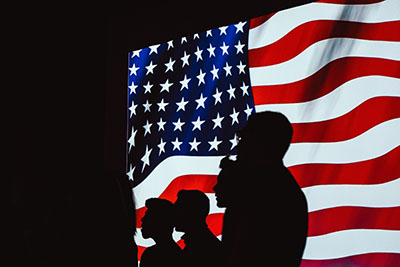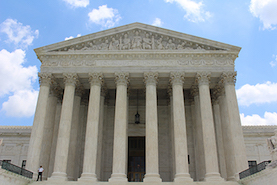Public Opinion and Political Participation
How Are Personal Values and Political Ideologies Connected?

The Distributional Preferences of Americans in 2013–16
Distributional preferences, or the tradeoff between fair-mindedness and self-interest and the tradeoff between equality and efficiency, shape individual opinions about how the government should redistribute income through policies like unemployment benefits and government-funded healthcare. In a study published in Experimental Economics, IPR economist Silvia Vannutelli and her colleagues study the distributional preferences of Americans between 2013 and 2016, a period of economic upheaval and persistent inequality, as well as social change—the first attempt to examine the stability of preferences across time using a large-scale experiment. The researchers asked over 1,000 participants from the American Life Panel (ALP), a longitudinal survey of a diverse group of Americans, to complete an experiment in 2013 and again in 2016, obtaining 687 responses. The participants were presented with a sequence of decision problems about how to allocate a budget between themselves and another individual. The researchers then matched the experimental results with demographic, political, and economic information from the ALP survey to study if and how distributional preferences are explained by personal attributes, political preferences, and/or life events. Looking at the economic dimension, the researchers find that distributional preferences varied widely among the participants, with higher income being associated with greater self-interest. People whose household income increased became more self-interested, but did not see changes in their equality-efficiency orientation. The researchers also evaluate the link between political decisions and distributional preferences and find that subjects who voted for the Democratic candidate in the presidential election in both 2012 and 2016, reflecting a clear Democratic partisan orientation, become more equality-oriented. Intriguingly, shifting political allegiances is not associated with a change in distributional preferences. Despite these changes, the results show that distribution preferences are stable over time and that individual preferences in 2013 are highly predictive of those in 2016, even with social and economic turmoil in the country.
What Do Americans Know About Politics?
 People seem to know more about politics when they are asked multiple-choice questions rather than “open-ended” questions that don’t allow survey-takers to select the correct answer from a list of options. In turn, scholars have argued that the use of open-ended questions has caused scholars to underestimate what the public knows about politics. In the British Journal of Political Science, IPR political scientist John Bullock and his co-author, Kelly Rader, challenge this argument. They propose that measured levels of political knowledge depend less on question type (multiple-choice or open-ended) than on the response options that accompany multiple-choice questions. The researchers explore this possibility by running an experiment about the Supreme Court with a national sample of 1,961 subjects. They asked subjects factual questions about politics—some open-ended, others multiple-choice. They also varied the number and difficulty of the response options to the multiple-choice questions. For example, difficult and incorrect response options for the chief justice’s name were names of others who had served on the Court, while the easy and incorrect response options were names of men who have never been prominent in public life. The results show that offering subjects five response options instead of three reduced estimated knowledge levels by 12 percentage points. Additionally, they show that estimated knowledge levels fell by 24 percentage points when subjects saw the difficult response options. Taken together, the effect of varying the number and difficulty of response options clearly outweighed the effect of asking multiple-choice questions rather than open-ended questions. This research has important implications for scholars’ arguments about the public’s understanding of politics: it shows that measurements of the public’s level of political knowledge depend on the form of the questions that scholars are asking.
People seem to know more about politics when they are asked multiple-choice questions rather than “open-ended” questions that don’t allow survey-takers to select the correct answer from a list of options. In turn, scholars have argued that the use of open-ended questions has caused scholars to underestimate what the public knows about politics. In the British Journal of Political Science, IPR political scientist John Bullock and his co-author, Kelly Rader, challenge this argument. They propose that measured levels of political knowledge depend less on question type (multiple-choice or open-ended) than on the response options that accompany multiple-choice questions. The researchers explore this possibility by running an experiment about the Supreme Court with a national sample of 1,961 subjects. They asked subjects factual questions about politics—some open-ended, others multiple-choice. They also varied the number and difficulty of the response options to the multiple-choice questions. For example, difficult and incorrect response options for the chief justice’s name were names of others who had served on the Court, while the easy and incorrect response options were names of men who have never been prominent in public life. The results show that offering subjects five response options instead of three reduced estimated knowledge levels by 12 percentage points. Additionally, they show that estimated knowledge levels fell by 24 percentage points when subjects saw the difficult response options. Taken together, the effect of varying the number and difficulty of response options clearly outweighed the effect of asking multiple-choice questions rather than open-ended questions. This research has important implications for scholars’ arguments about the public’s understanding of politics: it shows that measurements of the public’s level of political knowledge depend on the form of the questions that scholars are asking.
Gender and Bureaucratic Corruption
While research exists comparing the different ways men and women govern, a related question is which gender is more corrupt when holding positions of public office. In the Journal of Law, Economics, and Organization, IPR economist Silvia Vannutelli and her colleagues examine the connection between gender and bureaucratic corruption among elected officials in Italy and China. The researchers examine a dataset of Italian officials who presided over at least one procurement auction between 2000 and 2016 with the value of at least €40,000. They also analyzed a dataset of all Chinese bureaucrats who held the position of prefecture mayor or party secretary between 1979 and 2014. The researchers then compared the datasets to Italian and Chinese datasets of officials investigated for corruption. In both countries, women were less likely to be investigated for corruption compared to men. The Italian female officials were 22% less likely to be investigated for corruption and Chinese female officials were 81% less likely to have been arrested for corruption compared to male. The researchers also analyzed survey data of Italian officials collected by other researchers in 2020 to understand why women face fewer investigations and find that women followed more strict legal protocols than their male counterparts. The researchers speculate that women may face more leniency from law enforcement or that men may have more opportunities to commit corruption, but they suggest that future research investigate the gender difference further.
When Do Citizens Engage in Corruption?
One in four citizens across the globe report paying a bribe in the past year to obtain public services. Yet, even in countries where corruption is prevalent, few people always give bribes. In a working paper, political scientist and IPR associate Jordan Gans-Morse and his colleagues ask what prompts citizens to bribe. The researchers conducted an experiment in Ukraine, a nation that prior to Russia’s February 2022 invasion was engaged in a longstanding struggle to root out corruption, recruiting 3,060 respondents through Facebook. They presented participants with two scenarios in which a citizen seeks a service from a public servant, one to receive a driver's license and the other to be treated at a healthcare clinic. Respondents were asked to gauge how likely these citizens would be to bribe the officials, and how likely they themselves would be to offer a bribe. Among other factors, red tape, urgency of needing public services, and access to substitute service providers influenced the decision to bribe. Additionally, citizens were much more willing to make a bribe when those around them were also participating in bribery. These findings imply that understanding more about the demand side of bribery can inform policy efforts and offer insights into the types of institutional reforms most likely to reduce corruption.
The Relation Between Demographics and Gathering Socially During the Pandemic
During the COVID-19 pandemic, public health officials encouraged people to limit social gatherings to curb the spread of the coronavirus. In Nature Scientific Reports, IPR statistician Elizabeth Tipton and her colleagues explore which demographic groups are the most likely to attend social gatherings during the pandemic. They examined a dataset of 87,169 individuals from 41 countries, which accounted for 73% of the world’s population in 2020. These individuals all answered a survey between March–April 2020 asking whether the statement ”I did not attend social gatherings” described their behavior over the last week, and they indicated their age, gender, education, and household income. In a machine-learning analysis of the data, the researchers show that people who socialized were more male than female in 95% of the countries, low-income than high-income in 80%, younger than older in 78%, and lower educated than higher educated in 66%. The researchers conclude that while there are patterns among those who socialize—who are more likely to be young men with lower income and less education—public health officials should not generalize this behavior from one country to another because countries differed. For example, wealthier individuals were more prone to attend social gatherings in one-third of countries. They suggest that targeting demographic subgroups within countries could help save public health resources and make public health messages more specific to the attitudes and behaviors of each group.